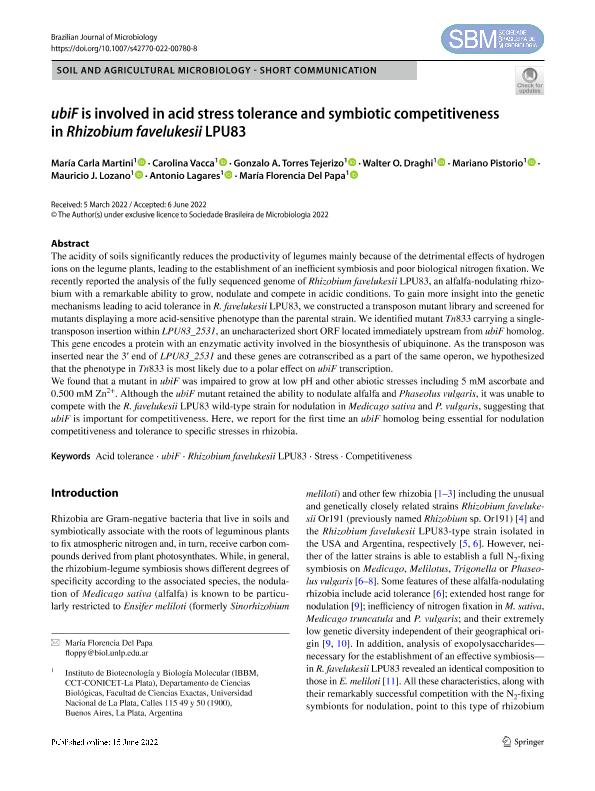Mostrar el registro sencillo del ítem
dc.contributor.author
Martini, María Carla

dc.contributor.author
Vacca, Carolina

dc.contributor.author
Torres Tejerizo, Gonzalo Arturo

dc.contributor.author
Draghi, Walter Omar

dc.contributor.author
Pistorio, Mariano

dc.contributor.author
Lozano, Mauricio Javier

dc.contributor.author
Lagares, Antonio

dc.contributor.author
del Papa, Maria Florencia

dc.date.available
2023-09-29T12:16:20Z
dc.date.issued
2022-06
dc.identifier.citation
Martini, María Carla; Vacca, Carolina; Torres Tejerizo, Gonzalo Arturo; Draghi, Walter Omar; Pistorio, Mariano; et al.; ubi F is involved in acid stress tolerance and symbiotic competitiveness in Rhizobium favelukesii LPU83; Sociedade Brasileira de Microbiologia; Brazilian Journal of Microbiology; 53; 6-2022; 1633–1643
dc.identifier.issn
1517-8382
dc.identifier.uri
http://hdl.handle.net/11336/213551
dc.description.abstract
The acidity of soils significantly reduces the productivity of legumes mainly because of the detrimental effects of hydrogen ions on the legume plants, leading to the establishment of an inefficient symbiosis and poor biological nitrogen fixation. We recently reported the analysis of the fully sequenced genome of Rhizobium favelukesii LPU83, an alfalfa-nodulating rhizobium with a remarkable ability to grow, nodulate and compete in acidic conditions. To gain more insight into the genetic mechanisms leading to acid tolerance in R. favelukesii LPU83, we constructed a transposon mutant library and screened for mutants displaying a more acid-sensitive phenotype than the parental strain. We identified mutant Tn833 carrying a single-transposon insertion within LPU83_2531, an uncharacterized short ORF located immediately upstream from ubiF homolog. This gene encodes a protein with an enzymatic activity involved in the biosynthesis of ubiquinone. As the transposon was inserted near the 3′ end of LPU83_2531 and these genes are cotranscribed as a part of the same operon, we hypothesized that the phenotype in Tn833 is most likely due to a polar effect on ubiF transcription. We found that a mutant in ubiF was impaired to grow at low pH and other abiotic stresses including 5 mM ascorbate and 0.500 mM Zn2+. Although the ubiF mutant retained the ability to nodulate alfalfa and Phaseolus vulgaris, it was unable to compete with the R. favelukesii LPU83 wild-type strain for nodulation in Medicago sativa and P. vulgaris, suggesting that ubiF is important for competitiveness. Here, we report for the first time an ubiF homolog being essential for nodulation competitiveness and tolerance to specific stresses in rhizobia.
dc.format
application/pdf
dc.language.iso
eng
dc.publisher
Sociedade Brasileira de Microbiologia

dc.rights
info:eu-repo/semantics/openAccess
dc.rights.uri
https://creativecommons.org/licenses/by-nc-sa/2.5/ar/
dc.subject
ACID TOLERANCE
dc.subject
COMPETITIVENESS
dc.subject
RHIZOBIUM FAVELUKESII LPU83
dc.subject
STRESS
dc.subject
UBIF
dc.subject.classification
Biología Celular, Microbiología

dc.subject.classification
Ciencias Biológicas

dc.subject.classification
CIENCIAS NATURALES Y EXACTAS

dc.title
ubi F is involved in acid stress tolerance and symbiotic competitiveness in Rhizobium favelukesii LPU83
dc.type
info:eu-repo/semantics/article
dc.type
info:ar-repo/semantics/artículo
dc.type
info:eu-repo/semantics/publishedVersion
dc.date.updated
2023-07-04T10:59:56Z
dc.identifier.eissn
1678-4405
dc.journal.volume
53
dc.journal.pagination
1633–1643
dc.journal.pais
Brasil

dc.description.fil
Fil: Martini, María Carla. Consejo Nacional de Investigaciones Científicas y Técnicas. Centro Científico Tecnológico Conicet - La Plata. Instituto de Biotecnología y Biología Molecular. Universidad Nacional de La Plata. Facultad de Ciencias Exactas. Instituto de Biotecnología y Biología Molecular; Argentina
dc.description.fil
Fil: Vacca, Carolina. Consejo Nacional de Investigaciones Científicas y Técnicas. Centro Científico Tecnológico Conicet - La Plata. Instituto de Biotecnología y Biología Molecular. Universidad Nacional de La Plata. Facultad de Ciencias Exactas. Instituto de Biotecnología y Biología Molecular; Argentina
dc.description.fil
Fil: Torres Tejerizo, Gonzalo Arturo. Consejo Nacional de Investigaciones Científicas y Técnicas. Centro Científico Tecnológico Conicet - La Plata. Instituto de Biotecnología y Biología Molecular. Universidad Nacional de La Plata. Facultad de Ciencias Exactas. Instituto de Biotecnología y Biología Molecular; Argentina
dc.description.fil
Fil: Draghi, Walter Omar. Consejo Nacional de Investigaciones Científicas y Técnicas. Centro Científico Tecnológico Conicet - La Plata. Instituto de Biotecnología y Biología Molecular. Universidad Nacional de La Plata. Facultad de Ciencias Exactas. Instituto de Biotecnología y Biología Molecular; Argentina
dc.description.fil
Fil: Pistorio, Mariano. Consejo Nacional de Investigaciones Científicas y Técnicas. Centro Científico Tecnológico Conicet - La Plata. Instituto de Biotecnología y Biología Molecular. Universidad Nacional de La Plata. Facultad de Ciencias Exactas. Instituto de Biotecnología y Biología Molecular; Argentina
dc.description.fil
Fil: Lozano, Mauricio Javier. Consejo Nacional de Investigaciones Científicas y Técnicas. Centro Científico Tecnológico Conicet - La Plata. Instituto de Biotecnología y Biología Molecular. Universidad Nacional de La Plata. Facultad de Ciencias Exactas. Instituto de Biotecnología y Biología Molecular; Argentina
dc.description.fil
Fil: Lagares, Antonio. Consejo Nacional de Investigaciones Científicas y Técnicas. Centro Científico Tecnológico Conicet - La Plata. Instituto de Biotecnología y Biología Molecular. Universidad Nacional de La Plata. Facultad de Ciencias Exactas. Instituto de Biotecnología y Biología Molecular; Argentina
dc.description.fil
Fil: del Papa, Maria Florencia. Consejo Nacional de Investigaciones Científicas y Técnicas. Centro Científico Tecnológico Conicet - La Plata. Instituto de Biotecnología y Biología Molecular. Universidad Nacional de La Plata. Facultad de Ciencias Exactas. Instituto de Biotecnología y Biología Molecular; Argentina
dc.journal.title
Brazilian Journal of Microbiology

dc.relation.alternativeid
info:eu-repo/semantics/altIdentifier/url/https://link.springer.com/article/10.1007/s42770-022-00780-8
dc.relation.alternativeid
info:eu-repo/semantics/altIdentifier/doi/http://dx.doi.org/10.1007/s42770-022-00780-8
Archivos asociados
